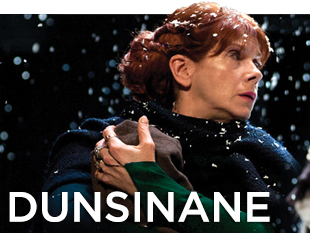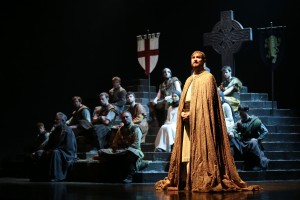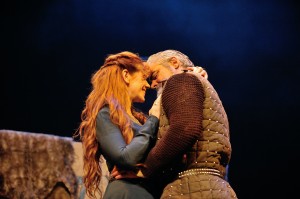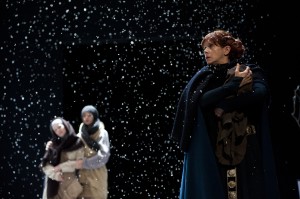THE SCOTTISH TRAGEDY: NEVER SAY DIE
You can’t kill the Scottish tragedy. Written 408 years after Macbeth, Dunsinane is the Shakespeare sequel we never knew we needed. Now on tour at Chicago Shakespeare Theater’s Navy Pier, this co-production by the National Theatre of Scotland and Royal Shakespeare Theater brings new wounds to some very different combat. David Greig’s 2010 prolongation of Macbeth pushes the Dark Ages into the present (namely a recent referendum). There’s no tale of how three witches and ruthless ambition corrupt two Scottish aristocrats; Dunsinane is all about power politics and embattled nationalism.
In 150 minutes Greig’s revisionist drama vibrantly conjures up a post-Macbeth descent into even more anarchy and blood-letting. This time Scotland is no longer split from within between Macbeth’s malevolence and Malcolm and Macduff, brave countrymen fighting a tyrant who bears as much as sheds their blood. Sick of war, Scotland is now trapped in a conflict from without. The stakes are strategically different and tauntingly contemporary.
If you credit Greig’s spirited retelling, it was the English who overthrew Macbeth when Birnam Wood came to Dunsinane. Noble Macduff did not vanquish a vicious, abandoned oppressor. No, his unmentioned English allies killed the killer. And Lady Macbeth, now called Gruach (Siobhan Redmond), did not go crazy and commit suicide. The she-wolf somehow survives and her son Lulach (Fred Geyer) has fled to seeming safety.
Wait, there’s more!: Malcolm (Ewan Donald), far from being a liberator who cleanses the kingdom as Fortinbras will Denmark after Hamlet’s sacrifice, turns out to be an effete psychopath. This pale prince is willing to marry the widow of his nemesis if it will confuse the Gaelic rebels and please his English overseers. Malcolm, a very cold traitor, was, it seems, raised in England and misses English oaks and hunting horns. Dividing and conquering, mincing Malcolm will prey on his minions with a terroristic shock and awe.
In Dunsinane it’s up to the successful invader, the grizzled English commander Siward (Darrell D’Silva), to reluctantly restore order (as in English dominance). Suborning the highland lords and lowland serfs, the realm’s new regent will subdue these errant savages with a “heart and minds” pacification. If this means eliminating any claimants (so Macbeth’s progeny prevail no more than did Banquo’s), so be the slaughter.
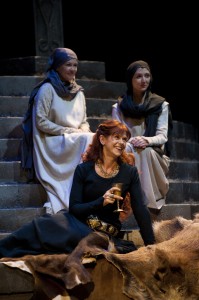 What cynical Dunsinane delivers that Macbeth can’t (it’s too busy creating crises) is a sense of the strangeness of Scotland to the outside world. As a narrating boy soldier (Tom Gill) describes it, it’s a frigid wasteland where they speak the wrong language. It’s worth looting but not governing (though the white hills can be pretty against a blue sky).
What cynical Dunsinane delivers that Macbeth can’t (it’s too busy creating crises) is a sense of the strangeness of Scotland to the outside world. As a narrating boy soldier (Tom Gill) describes it, it’s a frigid wasteland where they speak the wrong language. It’s worth looting but not governing (though the white hills can be pretty against a blue sky).
To these “fish out of water” occupiers whatever seems is more potent than what little is. Macduff (Keith Fleming) tries to explain to Siward the maddeningly complex clan loyalties that make tribal disputes more important than the common defense. Just as Cleopatra played the Romans against the Egyptians, the old/new Queen Gruach uses spells and superstition to pit Brits against Celts. She’s said to eat babies and to offer potions that transform soldiers into birds. Rather than be raped, a peasant “hen girl” turns into a suicidal stabber. Rather than surrender, Scotland’s “bravehearts” vow eternal defiance to the self-proclaimed saviors from the south. As in Iraq or Afghanistan, it’s hard to tell friend from foe.
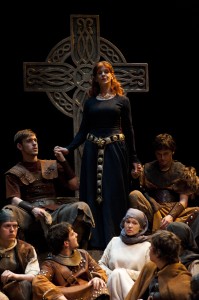 It’s here that Dunsinane, a very political sequel, almost becomes a propaganda play: Given this tragedy’s polemical mindset, Dunsinane inevitable weighs in on the now-discredited (or at least outvoted) Scottish independence movement. Considered as a screed on Scottish separatism, the play ironically seems more dated than Macbeth and its universal depiction of guilt as self-destruction. 1606 seems more grounded than 2010 ever was.
It’s here that Dunsinane, a very political sequel, almost becomes a propaganda play: Given this tragedy’s polemical mindset, Dunsinane inevitable weighs in on the now-discredited (or at least outvoted) Scottish independence movement. Considered as a screed on Scottish separatism, the play ironically seems more dated than Macbeth and its universal depiction of guilt as self-destruction. 1606 seems more grounded than 2010 ever was.
But, galvanized by Roxana Silbert’s rampaging staging and a pulsating live score by Nick Powell, Dunsinane remains a strong show with an attractive young cast. Especially valuable is its Henry V-style portrayal of ordinary archers and axmen coping with sudden death, extorting victims, and combating homesickness. The extensive, if extraneous, debate between Malcolm and Siward on means and ends carries a certain philosophical heft even if it never advances the action. (Shakespeare rightly never indulges in abstract arguments.) Also, there’s a wonderful wedding dance straight out of Brigadoon that’s too happy not to end in carnage.
Unlike Macbeth, Dunsinane’s snow-filled finale ends in an impassse: Macbeth’s lineage still threatens the throne. Perfidious Albion refuses to go home. One tyranny has replaced another in this “tale of sound and fury, told by an idiot, signifying nothing.” Out, out–yet again–brief candle!
photos by Jason Ma, Richard Campbell, and Ka Lam
Dunsinane
National Theatre of Scotland and the Royal Shakespeare Company
presented by Chicago Shakespeare
Courtyard Theater on Navy Pier
ends on March 22, 2015
for tickets, call 312.595.5600 or visit CST
for more info, visit National Theatre of Scotland
then plays March 27 – April 5, 2015 at the Wallis in Beverly Hills
for tickets, visit The Wallis
